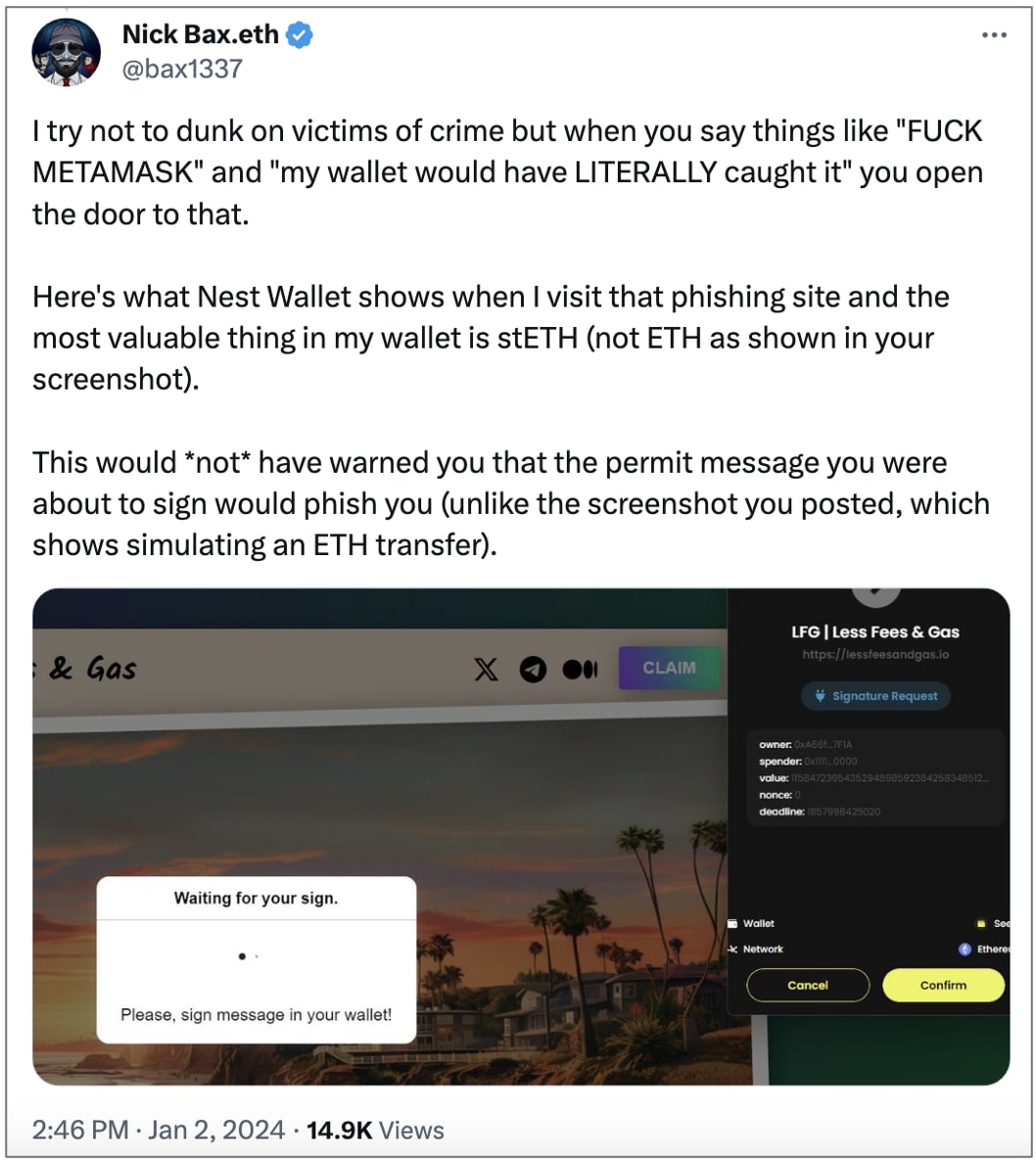Crypto wallet founder loses $125,000 to fake airdrop website

A crypto wallet service co-founder shares with the world his agony after losing $125,000 to a crypto scam.
The startup CEO, who at the time believed he was on a legitimate cryptocurrency airdrop website, realized after his loss that the domain he’d went on was setup for the purposes of phishing unsuspecting users.
Mistake costs crypto wallet CEO $125,000
Bill Lou, co-founder of Nest Wallet, a cryptocurrency wallet startup, has been left feeling “devastated” after being scammed by what appeared to be a crypto giveaway website to him at the time.
“I just got scammed out of $125k of stEth while trying to claim the $LFG airdrop. And I’m a fking founder of a wallet startup that’s trying to improve wallet security…,” writes Lou, on social media.
“I can’t believe this is happening, I’ve always been so careful. I saw article guide to the airdrop and follow the link to sign a message. I didn’t even question it….”
A cryptocurrency “airdrop” refers to a marketing strategy in which a company gives away nominal amounts of coins or tokens to wallet addresses as a means to promote its blockchain service, or to ask for minor favors from community members in return—such as the token recipients giving shout outs to the company on social media.
The CEO made the mistake of believing a crypto airdrop article that had been published on Medium.
The now-removed article was intended to drive traffic to a lookalike phishing domain, lessfeesandgas[.]io.
Lou later realized that the domain had been impersonating lessfeesandgas.org, a legitimate website, as a part of a scam.

He shared the exact transaction associated with the blunder that cost him 52 stEth, approximately $125,000 at the time (and $117,723.43 at the time of writing).

(BleepingComputer, via Etherscan.io)
Claims his product is secure; gets ridiculed
Although the co-founder garnered a fair amount of support and sympathy for being a victim of a scam, he was also ridiculed by some for claiming that his product could have prevented this.
“I was using Metamask instead Nest Wallet because I had a test version installed and was fixing some bugs,” wrote Lou.
“I don’t want to seem like an asshole promoting his own product but my wallet would have LITERALLY caught it. F##K METAMASK, F##K MY OWN STUPIDITY. Greedy ass trying to claim an airdrop at midnight instead of going to sleep…”

In response to Lou’s claim, Nick Bax, a user on social media responded:
“I try not to dunk on victims of crime but when you say things like ‘F##K METAMASK’ and ‘my wallet would have LITERALLY caught it’ you open the door to that.”
The user demonstrated why Lou’s product would not have necessarily safeguarded an unsuspecting user from this phishing attack:

Furthermore, Bax says he’s now got $600 stuck in Nest Wallet due to a bug, while running this little demonstration contesting Lou’s claim.
Comments from other social media users appeared to both support Lou, and mock the ironic situation.
The recent upsurge in cryptocurrency scams has spared no one, not even industry experts. Just last week, BleepingComputer reported a blockchain dev losing his crypto after being approached on LinkedIn for a “job interview,” and completing a JavaScript take-home assignment, that was a scam in disguise.
Unfortunate stories like Lou’s, and that of the blockchain developer, will hopefully raise security awareness in the blockchain sphere and caution users to be extremely careful when dealing with cryptocurrency websites, job assignments, and deals that look too good to be true.


